Key takeaways:
- Anticipating seasonal expenses, such as heating bills and holiday shopping, is crucial for effective budgeting.
- Creating a budget fosters financial clarity, reducing stress from unexpected costs and enabling better prioritization of spending and saving.
- Utilizing finance mobile apps can help track expenses, categorize spending, and adapt budgets based on personal financial habits.
- Regularly reviewing and adjusting budgets, along with visualizing financial progress, enhances overall budget management and motivation.
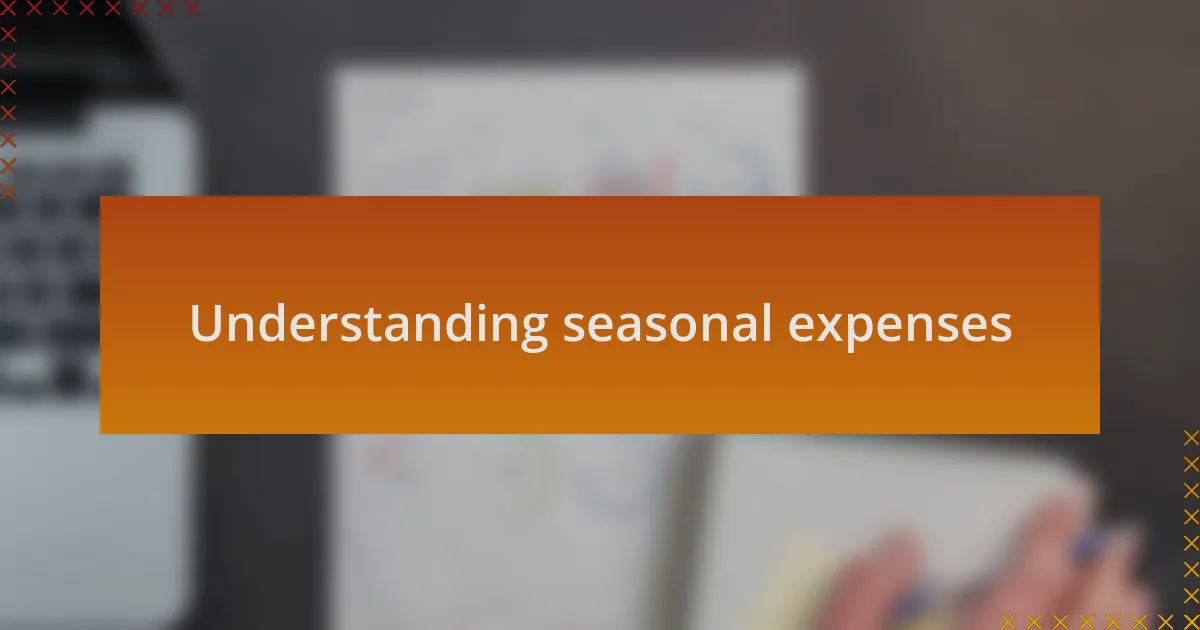
Understanding seasonal expenses
Seasonal expenses can catch anyone off guard if they aren’t properly anticipated. For instance, I remember one winter when my heating bill nearly doubled, and it made me realize just how important it is to factor in these variable costs. It’s like preparing for a surprise party—only the surprise can be a hefty bill that shakes up your budget.
Thinking about seasonal expenses also involves reflecting on the rhythm of our lives. Have you ever noticed how summer brings about increased travel costs? I once planned a vacation without considering the peak season rates, and it taught me to be proactive about my budgeting. By recognizing these patterns, we can better prepare ourselves financially.
I find it helpful to treat seasonal expenses like a separate line item in my budget. When I bundled together costs like holiday shopping or back-to-school supplies, it felt less overwhelming. By anticipating these expenses, I’ve learned to allocate funds throughout the year instead of scrambling at the last minute. Doesn’t it make you feel more empowered to take control of your finances in this way?
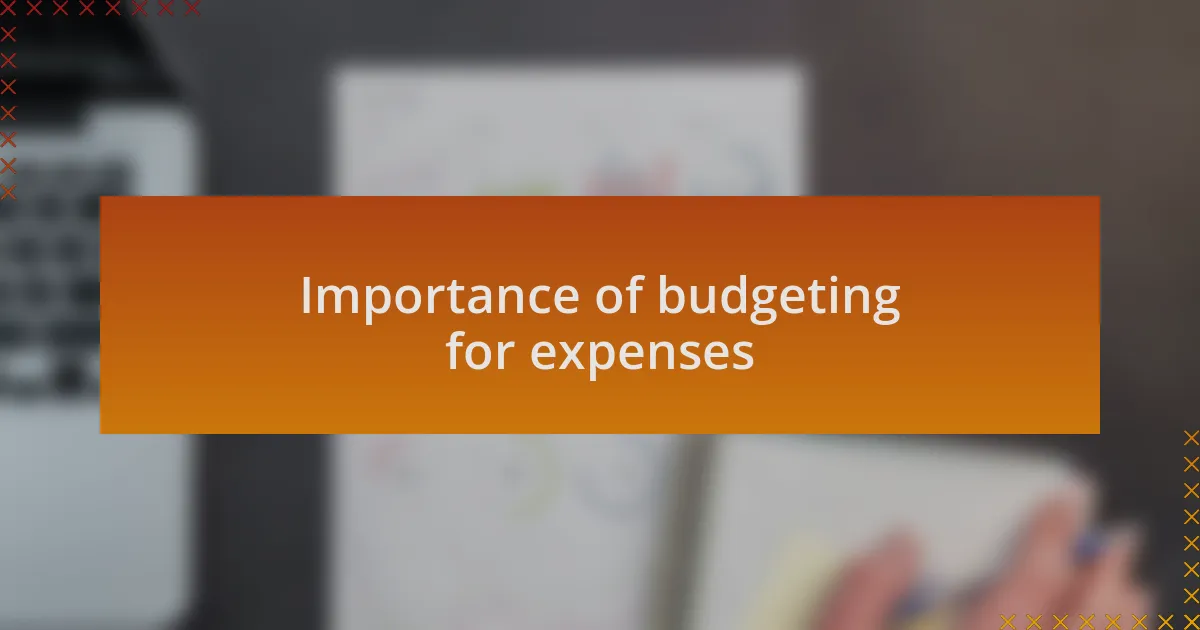
Importance of budgeting for expenses
Budgeting for expenses is crucial because it gives us clarity and control over our financial situation. I’ve often found myself feeling overwhelmed when unexpected costs arise, like last summer when my air conditioning unit needed repairs. Establishing a budget made it easier for me to handle such surprises, as I had already set aside funds specifically for emergencies. Have you ever faced a similar financial panic due to an unforeseen expense?
When we create a budget, we not only prepare for anticipated costs but also foster a sense of peace amid financial uncertainty. I can remember a time when I was juggling bills and realized I hadn’t accounted for yearly subscriptions. Once I started tracking these expenditures, it relieved a lot of stress. Isn’t budgeting empowering in that it allows us to enjoy life without constantly worrying about our bank balance?
Additionally, budgeting helps us prioritize our spending and savings. I recall planning my monthly budget and realizing I could set aside a little each month for a planned vacation. It was a small sacrifice that led to a fantastic getaway, and that experience profoundly impacted my view on budgeting. Linking our financial goals to our spending habits can truly make budgeting feel less like a chore and more like a stepping stone to achieving our dreams.
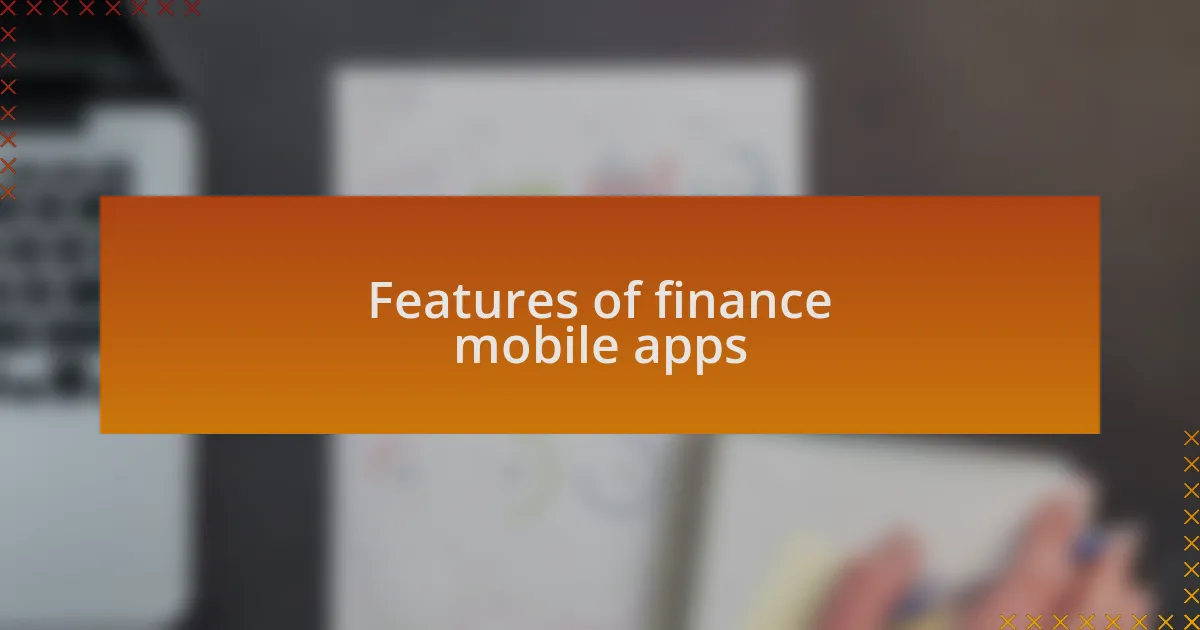
Features of finance mobile apps
Managing finances on the go has never been easier, thanks to the diverse features found in finance mobile apps. One feature I absolutely love is the ability to categorize expenses. It wasn’t until I started using my app that I noticed how much I was spending on dining out versus groceries. Have you ever been surprised by your own spending habits? It can truly open your eyes and motivate you to make healthier financial choices.
Another standout feature is real-time syncing with bank accounts. I remember a time when I overspent during a shopping spree, only to find out my account balance the next morning was a lot lower than I thought. Being able to view my transactions instantly on my app helped me become more mindful of my spending habits. Isn’t it comforting to have that information at your fingertips, allowing you to make better choices right then and there?
Many finance apps also offer budgeting tools that adapt to your lifestyle. When I set up my budget, the app considered my previous spending patterns, which made it feel tailored to me. I found this particularly useful during holiday seasons when expenses tend to spike. Have you ever adjusted a budget to accommodate an unexpected expense? It’s refreshing to see technology support us in navigating these fluctuations with ease.
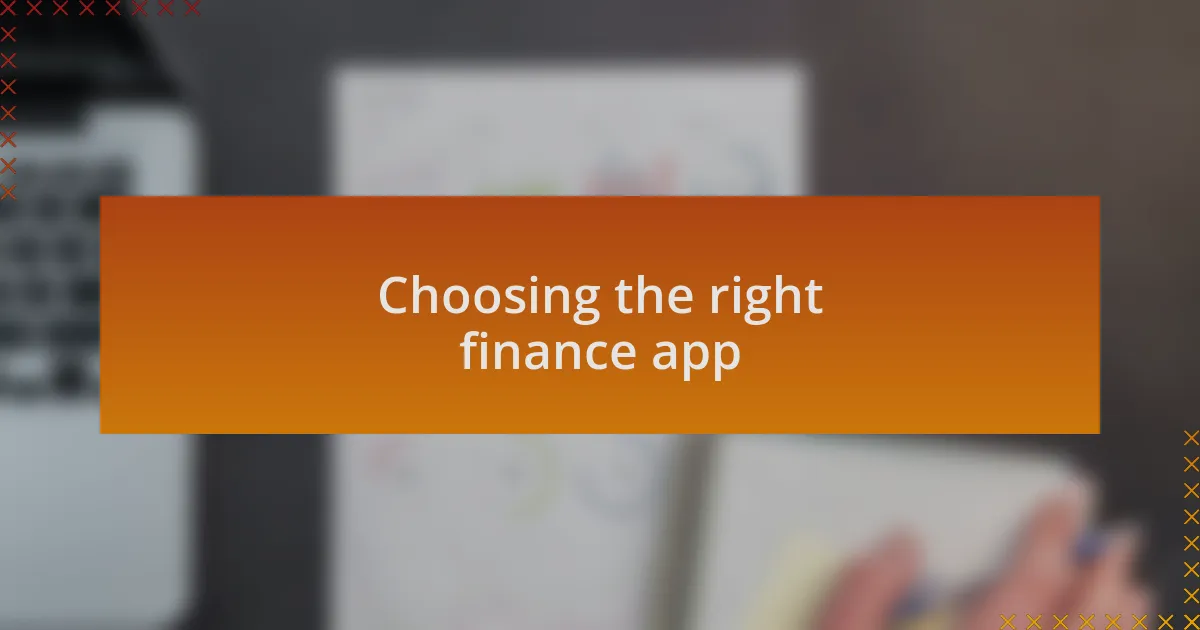
Choosing the right finance app
When it comes to choosing the right finance app, it’s essential to assess your personal financial needs. I recall the time I downloaded an app that was highly rated, only to find it lacked the specific budgeting tools I required. Have you ever faced a similar disappointment? The features that matter most to you can make all the difference in your financial journey, so take the time to evaluate them carefully.
Another critical factor is the app’s user interface. I’ve tried apps that were visually cluttered, making it challenging to focus on my finances. A clean, intuitive layout not only improves my experience but also encourages me to use the app more consistently. Think about your own habits—how much easier would budgeting be if you enjoyed navigating your finances?
Finally, consider the investment in your chosen app. Some come with a subscription fee while others are free but may have ads. I remember debating whether to pay for a premium version of an app, but the additional features ultimately provided me with greater insights into my spending. Are you willing to make that investment for the sake of better financial management? It’s a decision that can pay off in the long run, making budgeting feel less like a chore and more like a rewarding experience.
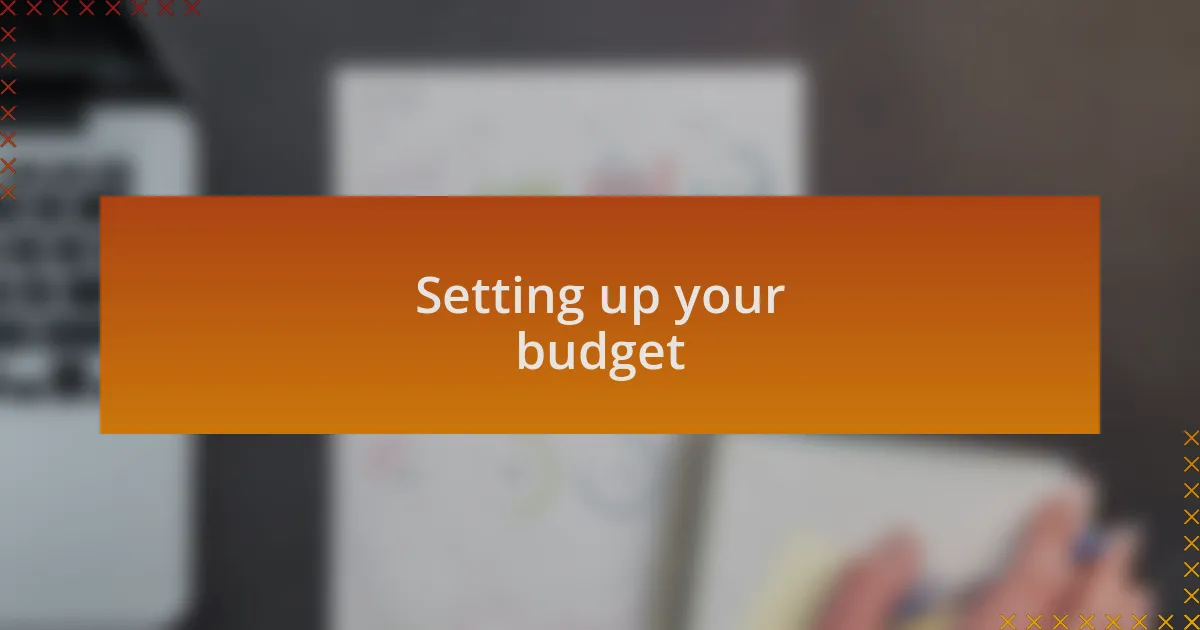
Setting up your budget
Setting up a budget can feel daunting, but breaking it down into manageable chunks makes the process easier. Personally, I like to start by listing all my fixed expenses, such as rent and utilities, alongside any seasonal costs, like holiday gifts or summer activities. This helps me see the full picture of my financial commitments—have you tried this approach before?
Once I have my core expenses lined up, I set aside funds for variable costs, such as groceries and entertainment. I learned the hard way that if I ignore these, I often overspend, which leads to stress. How do you find that balance between enjoying life and sticking to your budget?
Lastly, I regularly revisit my budget to make adjustments as needed. I remember a time when my budget went off the rails because I didn’t account for unexpected repairs. Do you keep your budget flexible? Adapting to changes keeps me grounded and supports my financial goals, making it a crucial habit in my budgeting journey.
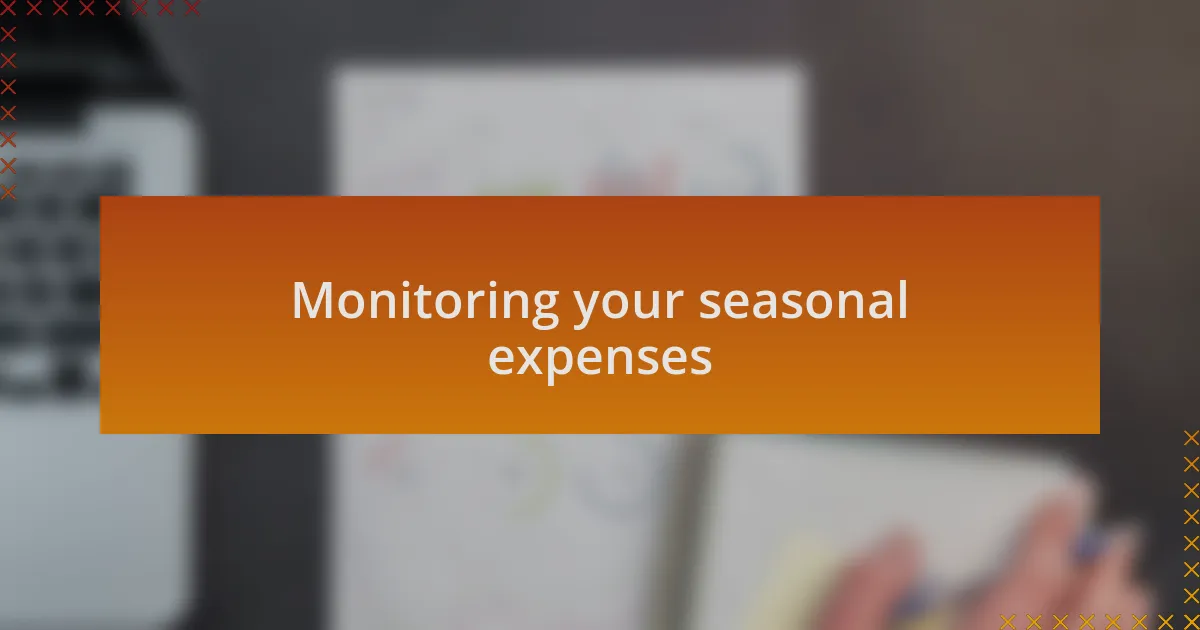
Monitoring your seasonal expenses
Keeping an eye on seasonal expenses is essential for maintaining financial balance throughout the year. I often set reminders on my phone to review these costs in advance. For instance, last year, I discovered that my holiday budget could use a boost when I noticed those extra delivery fees creeping in. Have you ever faced similar surprises?
I also like to categorize my seasonal expenses, which simplifies tracking them during specific times of the year. When I prepared for summer trips, I created a checklist of all the related costs—travel, accommodations, and activities. That way, when it was time to book, I already knew how much I could spend. Does organizational clarity help you feel more in control of your finances?
Sometimes, simply visualizing my seasonal expenses helps in recognizing patterns and planning better. By using my finance app, I’ve seen how my spending fluctuates during the holidays versus back-to-school months. This insight allows me to set aside appropriate savings ahead of time. How do you leverage technology to stay on top of your seasonal expenses?
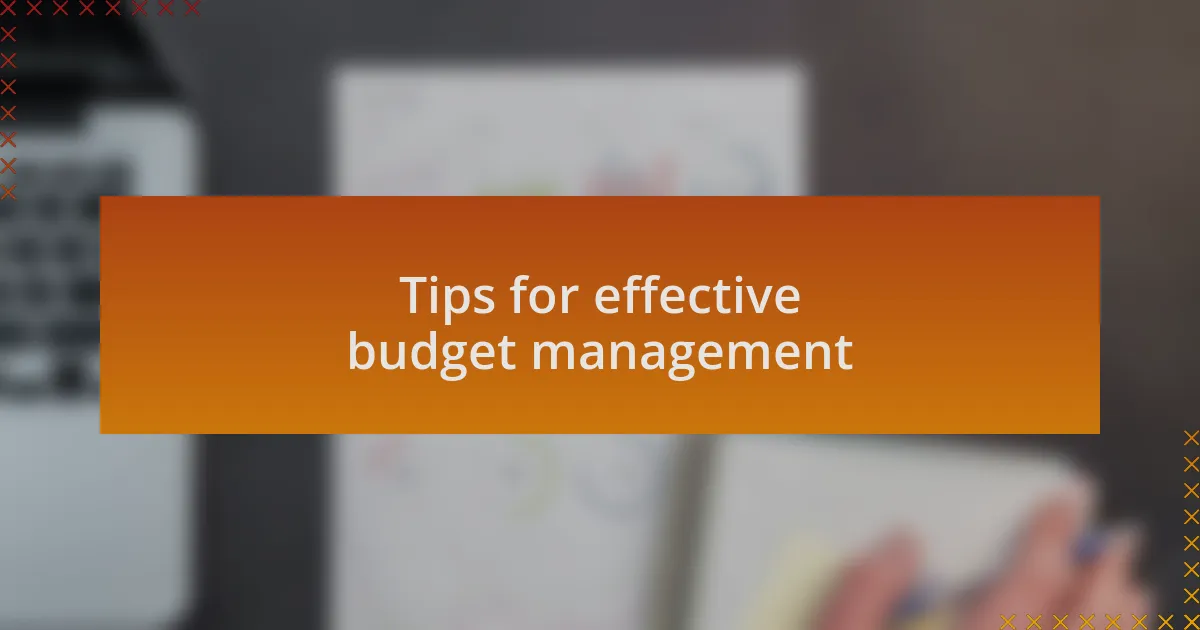
Tips for effective budget management
When it comes to effective budget management, I often turn to the 50/30/20 rule, which helps break down my spending into needs, wants, and savings. This concept was a game changer for me; by allocating a specific percentage for each category, I could see exactly where my money was going. Have you ever tried a budgeting method that just clicked for you?
Another tip that I’ve found invaluable is the importance of reviewing and adjusting my budget regularly. Every few months, I take a step back and reassess my financial situation, considering any upcoming expenses or unexpected changes in my income. For example, after changing jobs last year, I had to rework my budget to accommodate increased commuting costs. It’s amazing how these small tweaks can create a ripple effect on your financial health, wouldn’t you agree?
I also love to use visual tools like charts or graphs to represent my budget. Last month, I played around with a pie chart feature on my finance app, showing my expenses in a way that made them more digestible. It was surprisingly uplifting to see my savings grow over time; those visuals motivated me to stick to my budget even more. How does visualizing your financial progress impact your motivation?